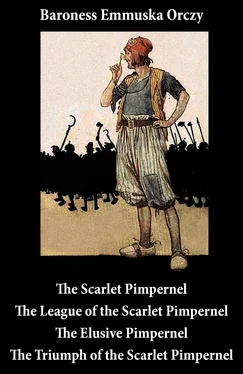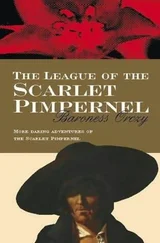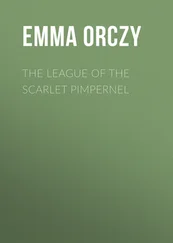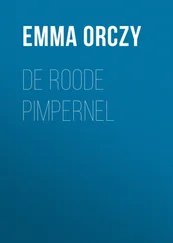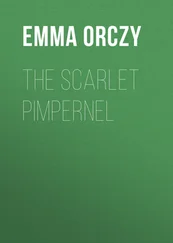"You never know," he would say, "and I'm not going to be caught like that fool Grospierre."
The women who drove the carts usually spent their day on the Place de la Greve, beneath the platform of the guillotine, knitting and gossiping, whilst they watched the rows of tumbrils arriving with the victims the Reign of Terror claimed every day. It was great fun to see the aristos arriving for the reception of Madame la Guillotine, and the places close by the platform were very much sought after. Bibot, during the day, had been on duty on the Place. He recognized most of the old hats, "tricotteuses," as they were called, who sat there and knitted, whilst head after head fell beneath the knife, and they themselves got quite bespattered with the blood of those cursed aristos.
"He! la mere!" said Bibot to one of these horrible hags, "what have you got there?"
He had seen her earlier in the day, with her knitting and the whip of her cart close beside her. Now she had fastened a row of curly locks to the whip handle, all colours, from gold to silver, fair to dark, and she stroked them with her huge, bony fingers as she laughed at Bibot.
"I made friends with Madame Guillotine's lover," she said with a coarse laugh, "he cut these off for me from the heads as they rolled down. He has promised me some more to-morrow, but I don't know if I shall be at my usual place."
"Ah! how is that, la mere?" asked Bibot, who, hardened soldier that he was, could not help shuddering at the awful loathsomeness of this semblance of a woman, with her ghastly trophy on the handle of her whip.
"My grandson has got the small-pox," she said with a jerk of her thumb towards the inside of her cart, "some say it's the plague! If it is, I sha'n't be allowed to come into Paris to-morrow." At the first mention of the word small-pox, Bibot had stepped hastily backwards, and when the old hag spoke of the plague, he retreated from her as fast as he could.
"Curse you!" he muttered, whilst the whole crowd hastily avoided the cart, leaving it standing all alone in the midst of the place.
The old hag laughed.
"Curse you, citoyen, for being a coward," she said. "Bah! what a man to be afraid of sickness."
"MORBLEU! the plague!"
Everyone was awe-struck and silent, filled with horror for the loathsome malady, the one thing which still had the power to arouse terror and disgust in these savage, brutalised creatures.
"Get out with you and with your plague-stricken brood!" shouted Bibot, hoarsely.
And with another rough laugh and coarse jest, the old hag whipped up her lean nag and drove her cart out of the gate.
This incident had spoilt the afternoon. The people were terrified of these two horrible curses, the two maladies which nothing could cure, and which were the precursors of an awful and lonely death. They hung about the barricades, silent and sullen for a while, eyeing one another suspiciously, avoiding each other as if by instinct, lest the plague lurked already in their midst. Presently, as in the case of Grospierre, a captain of the guard appeared suddenly. But he was known to Bibot, and there was no fear of his turning out to be a sly Englishman in disguise.
"A cart, . . ." he shouted breathlessly, even before he had reached the gates.
"What cart?" asked Bibot, roughly.
"Driven by an old hag. . . . A covered cart . . ."
"There were a dozen . . ."
"An old hag who said her son had the plague?"
"Yes . . ."
"You have not let them go?"
"MORBLEU!" said Bibot, whose purple cheeks had suddenly become white with fear.
"The cart contained the CI-DEVANT Comtesse de Tourney and her two children, all of them traitors and condemned to death."
"And their driver?" muttered Bibot, as a superstitious shudder ran down his spine.
"SACRE TONNERRE," said the captain, "but it is feared that it was that accursed Englishman himself—the Scarlet Pimpernel."
CHAPTER II DOVER: "THE FISHERMAN'S REST"
Table of Contents
In the kitchen Sally was extremely busy—saucepans and frying-pans were standing in rows on the gigantic hearth, the huge stock-pot stood in a corner, and the jack turned with slow deliberation, and presented alternately to the glow every side of a noble sirloin of beef. The two little kitchen-maids bustled around, eager to help, hot and panting, with cotton sleeves well tucked up above the dimpled elbows, and giggling over some private jokes of their own, whenever Miss Sally's back was turned for a moment. And old Jemima, stolid in temper and solid in bulk, kept up a long and subdued grumble, while she stirred the stock-pot methodically over the fire.
"What ho! Sally!" came in cheerful if none too melodious accents from the coffee-room close by.
"Lud bless my soul!" exclaimed Sally, with a good-humoured laugh, "what be they all wanting now, I wonder!"
"Beer, of course," grumbled Jemima, "you don't 'xpect Jimmy Pitkin to 'ave done with one tankard, do ye?"
"Mr. 'Arry, 'e looked uncommon thirsty too," simpered Martha, one of the little kitchen-maids; and her beady black eyes twinkled as they met those of her companion, whereupon both started on a round of short and suppressed giggles.
Sally looked cross for a moment, and thoughtfully rubbed her hands against her shapely hips; her palms were itching, evidently, to come in contact with Martha's rosy cheeks—but inherent good-humour prevailed, and with a pout and a shrug of the shoulders, she turned her attention to the fried potatoes.
"What ho, Sally! hey, Sally!"
And a chorus of pewter mugs, tapped with impatient hands against the oak tables of the coffee-room, accompanied the shouts for mine host's buxom daughter.
"Sally!" shouted a more persistent voice, "are ye goin' to be all night with that there beer?"
"I do think father might get the beer for them," muttered Sally, as Jemima, stolidly and without further comment, took a couple of foam-crowned jugs from the shelf, and began filling a number of pewter tankards with some of that home-brewed ale for which "The Fisherman's Rest" had been famous since that days of King Charles. "'E knows 'ow busy we are in 'ere."
"Your father is too busy discussing politics with Mr. 'Empseed to worry 'isself about you and the kitchen," grumbled Jemima under her breath.
Sally had gone to the small mirror which hung in a corner of the kitchen, and was hastily smoothing her hair and setting her frilled cap at its most becoming angle over her dark curls; then she took up the tankards by their handles, three in each strong, brown hand, and laughing, grumbling, blushing, carried them through into the coffee room.
There, there was certainly no sign of that bustle and activity which kept four women busy and hot in the glowing kitchen beyond.
The coffee-room of "The Fisherman's Rest" is a show place now at the beginning of the twentieth century. At the end of the eighteenth, in the year of grace 1792, it had not yet gained the notoriety and importance which a hundred additional years and the craze of the age have since bestowed upon it. Yet it was an old place, even then, for the oak rafters and beams were already black with age—as were the panelled seats, with their tall backs, and the long polished tables between, on which innumerable pewter tankards had left fantastic patterns of many-sized rings. In the leaded window, high up, a row of pots of scarlet geraniums and blue larkspur gave the bright note of colour against the dull background of the oak.
That Mr. Jellyband, landlord of "The Fisherman's Rest" at Dover, was a prosperous man, was of course clear to the most casual observer. The pewter on the fine old dressers, the brass above the gigantic hearth, shone like silver and gold—the red-tiled floor was as brilliant as the scarlet geranium on the window sill—this meant that his servants were good and plentiful, that the custom was constant, and of that order which necessitated the keeping up of the coffee-room to a high standard of elegance and order.
Читать дальше
